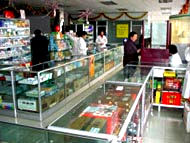 The newly implemented Pharmaceuticals Control Law has brought about a long-sought transformation of China's medicine industry.
The newly implemented Pharmaceuticals Control Law has brought about a long-sought transformation of China's medicine industry.
The revised law went into effect December 1 after two-and-half-year deliberation since the amendment to the Pharmaceuticals Control Law was officially launched in October 1998.
Zheng Xiaoyu, director of the State Drug Administration (SDA), said the implementation of the new law, coming shortly before China formally becomes the member of the World Trade Organization (WTO), was perfectly timed to bring the domestic pharmaceutical industry in line with WTO rules.
"The economic and social changes following China's WTO entry have brought about many new demands for the pharmaceutical sector. Therefore, we have performed 'major surgery' on the former Pharmaceuticals Control Law," Zheng said.
He said the number of provisions in the new law is now nearly double the amount in the original law; only two provisions remained unchanged.
Observers have pointed out that the domestic pharmaceutical industry will face great challenges after China's WTO accession.
It is necessary to keep the administration of high-quality medicine in line with the international standards if domestic pharmaceutical enterprises are to participate equally in global competition with their foreign counterparts, experts said.
Bai Huiliang, an SDA official, said that the good manufacturing practice (GMP), generally followed in the world, offers uniform criterion for quality medicine control.
"The new law clearly stipulates that China's medicine manufacturers must operate in accordance with the GMP standards, which conforms to the WTO's fundamental principles concerning the medicine production administration," Bai said.
Actually, China introduced concepts and provisions about GMP into the domestic pharmaceutical industry in the early 1980s, but the results were unsatisfactory.
"For a long time, China has failed to carry out strict administration over the operation of pharmaceutical enterprises," with so many small and low-productivity manufacturers set up at localities, thus causing a great waste of medical resources, Bai noted.
Statistics show that China had about 3,700 medicine producers in 1990, but the figure shot up to over 7,500 in 1998, and only 87 enterprises or workshops gained GMP certification.
Zheng Xiaoyu said that with the implementation of the new law, some 6,300 domestic pharmaceutical enterprises will be required to abide by GMP standards before the end of 2004.
Experts estimate that about a half of them will be shut down as a result of the GMP checkup, which enables the powerful enterprises to expand their scales quickly at a low cost.
Meanwhile, the new law will treat foreign medicine equally with domestic brands by stopping the practice of examining the imported medicine of each group and shifting the focus to market supervision.
Yu Mingde, an official with the State Trade and Economic Commission, said that the amended law has simplified the administrative approval procedures and established the regulations over the imported medicine's examination and registration, which both meet the demands of China's WTO entry.
As a matter of fact, the influence of the new law on China's medicine industry has been felt since it was passed by the Ninth National People's Congress Standing Committee this February.
The new law stipulates that the medicine sales should follow international conventions and meet China's needs. The establishment of medicine chain stores has become a common practice throughout the country.
Beijing now has over 360 chain stores out of the 1,000-plus drug retail stores. Shanghai vice-mayor Zhou Yupeng noted recently that Shanghai planed to set up 1,000 medicine chain stores before the end of 2002.
Feng Guo'an, director of the Beijing Drug Administration, said that since China's medicine retail trade will fully open to foreign investors by January 2003, it's crucial for the domestic drugstores to expand scale and strengthen competitiveness.
( December 9, 2001)
